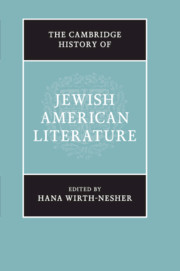Book contents
- The Cambridge History ofJewish American Literature
- The Cambridge History ofJewish American Literature
- Copyright page
- Contents
- Illustrations
- Notes on Contributors
- Book part
- Introduction
- Part I New World Encounters
- Part II Genres: Adopting, Adapting, Reinventing
- Part III Place and Peoplehood: Redefining “Here” and “There”
- Part IV Creating Fields
- 22 The Role of the Public Intellectual in American Culture
- 23 TheCaravan Returns
- 24 Poetics and Politics of Translation
- Part V New Perspectives
- Bibliography
- Index
24 - Poetics and Politics of Translation
from Part IV - Creating Fields
Published online by Cambridge University Press: 05 December 2015
- The Cambridge History ofJewish American Literature
- The Cambridge History ofJewish American Literature
- Copyright page
- Contents
- Illustrations
- Notes on Contributors
- Book part
- Introduction
- Part I New World Encounters
- Part II Genres: Adopting, Adapting, Reinventing
- Part III Place and Peoplehood: Redefining “Here” and “There”
- Part IV Creating Fields
- 22 The Role of the Public Intellectual in American Culture
- 23 TheCaravan Returns
- 24 Poetics and Politics of Translation
- Part V New Perspectives
- Bibliography
- Index
Summary
- Type
- Chapter
- Information
- The Cambridge History of Jewish American Literature , pp. 488 - 502Publisher: Cambridge University PressPrint publication year: 2015
- 1
- Cited by



